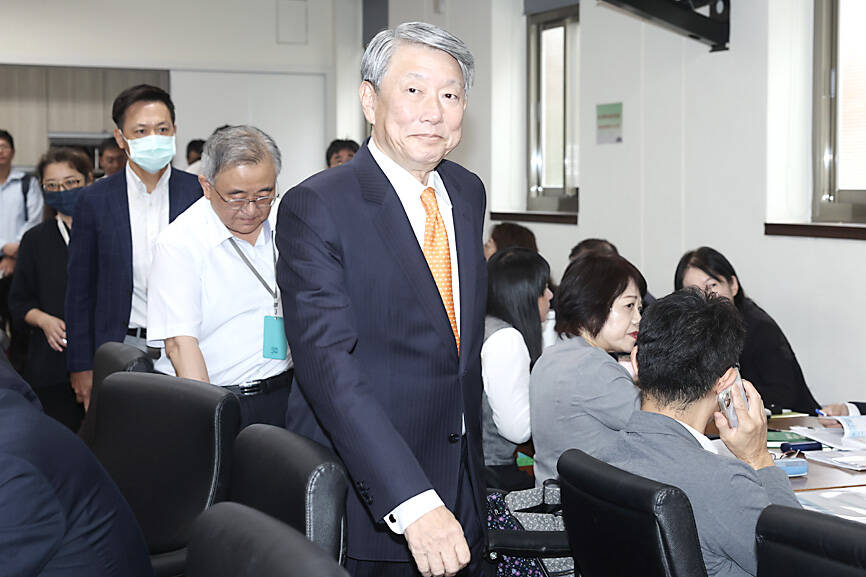Minister of Economic Affairs J.W. Kuo (郭智輝) yesterday said that trade negotiations with the US are still ongoing, after US Secretary of the Treasury Scott Bessent on Sunday said that nations failing to reach a deal with Washington would face the “reciprocal” tariffs US President Donald Trump announced in April.
Trump later suspended the high levies for 90 days to allow for trade talks and set a deadline tomorrow for nations to strike agreements with the US.
Asked whether the US tariff rate on Taiwan would stay at 32 percent and if potential US tariffs would prompt companies to relocate from Taiwan, Kuo declined to comment at a meeting of the legislature’s Economics Committee.

Photo: CNA
The meeting was called off at about 9am due to the impact of Typhoon Danas.
Nations including Taiwan have been pushing to strike deals with Washington over the past three months that would help them avoid the high US tariffs set to begin on Aug. 1.
So far, the Trump administration has only unveiled deals with the UK and Vietnam, while Washington and Beijing agreed to temporarily lower high levies on each other’s products.
At a previous Economics Committee meeting on June 23, Kuo said the outlook for the tariff negotiations appeared positive — based on the information the ministry had gathered — and the ministry would work hard to prevent China from exploiting Taiwan through product mislabeling and origin fraud.
Asked whether lowering tariffs on US car imports — a possible part of the trade deal with Washington — would hurt local automakers, Kuo said the impact would be limited, as US vehicles account for only a small share of the nation’s car imports.

CHAOS: Iranians took to the streets playing celebratory music after reports of Khamenei’s death on Saturday, while mourners also gathered in Tehran yesterday Iranian Supreme Leader Ayatollah Ali Khamenei was killed in a major attack on Iran launched by Israel and the US, throwing the future of the Islamic republic into doubt and raising the risk of regional instability. Iranian state television and the state-run IRNA news agency announced the 86-year-old’s death early yesterday. US President Donald Trump said it gave Iranians their “greatest chance” to “take back” their country. The announcements came after a joint US and Israeli aerial bombardment that targeted Iranian military and governmental sites. Trump said the “heavy and pinpoint bombing” would continue through the week or as long

TRUST: The KMT said it respected the US’ timing and considerations, and hoped it would continue to honor its commitments to helping Taiwan bolster its defenses and deterrence US President Donald Trump is delaying a multibillion-dollar arms sale to Taiwan to ensure his visit to Beijing is successful, a New York Times report said. The weapons sales package has stalled in the US Department of State, the report said, citing US officials it did not identify. The White House has told agencies not to push forward ahead of Trump’s meeting with Chinese President Xi Jinping (習近平), it said. The two last month held a phone call to discuss trade and geopolitical flashpoints ahead of the summit. Xi raised the Taiwan issue and urged the US to handle arms sales to

BIG SPENDERS: Foreign investors bought the most Taiwan equities since 2005, signaling confidence that an AI boom would continue to benefit chipmakers Taiwan Semiconductor Manufacturing Co’s (TSMC, 台積電) market capitalization swelled to US$2 trillion for the first time following a 4.25 percent rally in its American depositary receipts (ADR) overnight, putting the world’s biggest contract chipmaker sixth on the list of the world’s biggest companies by market capitalization, just behind Amazon.com Inc. The site CompaniesMarketcap.com ranked TSMC ahead of Saudi Aramco and Meta Platforms Inc. The Taiwanese company’s ADRs on Tuesday surged to US$385.75 on the New York Stock Exchange, as strong demand for artificial intelligence (AI) applications led to chip supply constraints and boost revenue growth to record-breaking levels. Each TSMC ADR represents

Pro-democracy media tycoon Jimmy Lai’s (黎智英) fraud conviction and prison sentence were yesterday overturned by a Hong Kong court, in a surprise legal decision that comes soon after Lai was jailed for 20 years on a separate national security charge. Judges Jeremy Poon (潘兆初), Anthea Pang (彭寶琴) and Derek Pang (彭偉昌) said in the judgement that they allowed the appeal from Lai, and another defendant in the case, to proceed, as a lower court judge had “erred.” “The Court of Appeal gave them leave to appeal against their conviction, allowed their appeals, quashed the convictions and set aside the sentences,” the judges